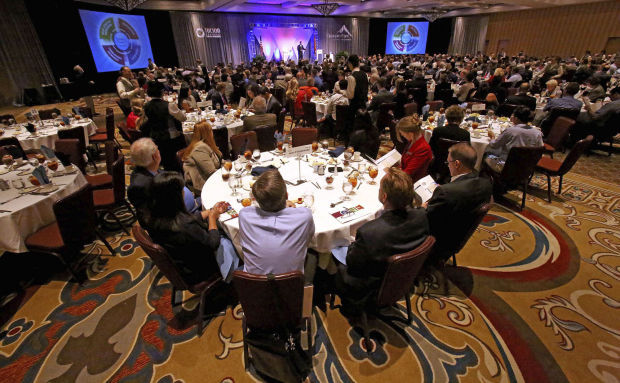A contract renewal before the Pima County Board of Supervisors for Southern Arizona’s regional economic development organization would pay as much as $651,000 for six months of service.
“You don’t survive and prosper economically unless you have an entity that’s like Sun Corridor,” Pima County Supervisor Sharon Bronson said.
Sun Corridor, formerly known as Tucson Regional Economic Opportunities or TREO, is a nonprofit economic development organization that has been a service provider for the county for nearly a decade. Bronson also sits on the Sun Corridor board as the county’s representative.
The proposed contract provides a base funding level of $441,000 for economic development services for the period from Jan. 5 to June 30. It also includes a $210,000 option to assist in the sale of county-owned properties, which the board could approve.
Bronson said the deal was well worth the expense.
“They have done very well at attracting new employers and helping current employers like Raytheon to expand,” she said.
Pima County Administrator Chuck Huckelberry also said the money paid to Sun Corridor over the years was well-spent.
“To market a region — particularly one that’s heavy on federal defense spending — is an incremental job,” Huckelberry said.
Sun Corridor spokeswoman Laura Shaw said the organization has numerous successes over the years that validate the public’s investment.
“Economic development is a long-term play,” Shaw said.
Among the successes, she said Sun Corridor has helped with the relocation and expansion of more than 100 companies to the region.
Those include Accelerate Diagnostics, HomeGoods, Arizona Canning Co., Comcast and Ventana Medical Systems.
“These are real jobs that are coming into the community,” Shaw said.
Bronson also said Sun Corridor was instrumental in organizing a trip to Huntsville, Alabama, in 2011 after this region’s largest private employer, Raytheon, chose the Southern city over Tucson for a manufacturing facilities expansion. “That was a wake-up call,” Bronson said.
It was that trip, Bronson said, that convinced county leaders of the need to create a buffer zone south of Raytheon to facilitate the defense contractor’s future expansions.
Since then, the county has purchased hundreds of acres of property in the area for nearly $6 million.
The county also recently completed a $12.7 million realignment of Hughes Access Road, now Aerospace Parkway, to allow for the Raytheon buffer.
The project also is seen as the first step in creating a defense, aerospace and other industrial employment corridor.
The project could begin to bear fruits soon.
While unable to disclose specifics, county officials have said a national company stands poised to announce its relocation to the Aerospace Parkway.
“I think you’re going to see this is going to be a significant announcement,” Bronson said.
Some, however, have questioned the value of paying a private-sector operator to provide a service that governments already provide through economic development departments.
“This should be a regional cooperative,” said Tucson City Councilman Steve Kozachik.
Kozachik said the region’s governments should consider banding together to conduct economic development services as a single entity.
“I think that’s one area the city would benefit from if we regionalized our economic development and went with the county.”
In addition to speaking with a unified voice, that would provide additional transparency and accountability, he said.
When the city contracted with Sun Corridor, which it no longer does, Kozachik said he was concerned that the group did not provide enough detail in its periodic performance reports.
“They shouldn’t be operating under any secrecy if you’re getting government money,” Kozachik said. “You’ve got to be able to justify your existence.”
Secrecy, or at least being able to operate beyond intense public scrutiny, is at times crucial to the work of economic development and business recruitment, some argue.
“We do our work under the radar at the company’s request,” Shaw said, adding many companies require a measure of secrecy in their relocation or expansion efforts.
In addition, private companies frequently want to be the ones to announce relocation or expansion plans and don’t want their communications to be subject to public-records laws.
Put another way, Huckelberry said working with Sun Corridor or other private-sector economic development organizations frees them from “public-sector handcuffs.”
“They have the private-sector ability to operate much more stealthily,” Huckelberry said.
He said he doesn’t oppose the idea to have a county-led effort at economic development, suggesting it may even benefit the region because it could minimize municipal competition for new business.
“We don’t care where a company looks in Pima County — whether in Oro Valley, Marana, South Tucson or Tucson — it’s all in Pima County,” Huckelberry said.
The Pima County-Sun Corridor arrangement isn’t dissimilar from how other communities approach economic development.
“What Sun Corridor does as an economic development organization is very similar to what is done in many cities across the country,” said Mike Varney, president and CEO of Tucson Metro Chamber.
The Pima County Board of Supervisors plan to discuss the contract at its Tuesday meeting.
Supervisors meet at 9 a.m. in the County Administration Building at 130 W. Congress St.





